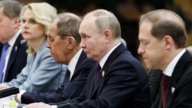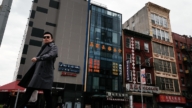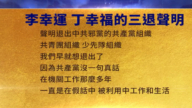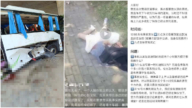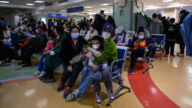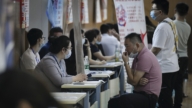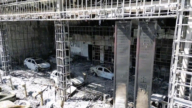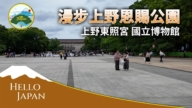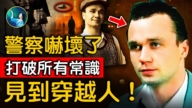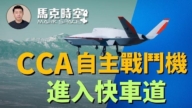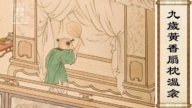【新唐人2012年12月25日讯】近年来,大陆警民矛盾日益恶化,各地警民冲突不断,针对这种情况,中国人民公安大学宣布成立了“警察公共关系研究中心”,专门培养所谓公关警察。中心负责人声称,设立中心目地在和谐警民关系。但警民矛盾的症结在哪儿﹖评论认为,中共首先要改变暴力维稳的手段。也有警察认为,中国当局制造新的犯罪活动来掩盖旧的冤案,冤案只会越来越严重,因此警民难和谐!
据大陆媒体报导,“中国人民公安大学警察公共关系研究中心”12月22号在北京正式成立。据了解,这个中心将于2013年起招收公共关系警察研究生,培养高端的“公关警察”。
公关中心负责人孙娟对媒体说,中心成立的主旨在通过公关课程的培训,推动促进警民关系的“和谐发展”。但有评论人士认为,大陆现在的警民关系,并非学点公关技巧就能改善的,警察缺乏的并不是表面上的理论知识。
北京时政观察人士华颇:“因为这些年来暴力维稳使警察公关形象非常丑陋,人民对警察印象非常恶劣,所以他借鉴了香港有警民公关科等等,想要对警察形象做一种修补,但我认为于事无补。因为要改变警察形象,中共首先要改变暴力维稳的手段,从根本上改变。”
蒙冤警察陈军育:“它现在这些什么公共关系,那都是摆出来的花架子,就是拿出来糊弄你一下,跟本就不会给你解决什么实质问题。关键是在怎么样用实质的行动来处理公共关系,也就是跟广大的公民在执法活动中产生的一些矛盾该怎么样正确的依法依规来处理的问题,实际上,这个根子还是在上面。”
蒙冤上访的警察陈军育还指出,其实“警察公共关系部门”在公安局内部早就存在,只不过现在具体化、公开化了,唯一的区别就是由政府部门变成了学术研究机构。他说,其实就是换汤不换药,完全是纸上谈兵。
近年来,大陆社会矛盾加深、暴力执法现象的泛滥,使得各地的大规模警民冲突事件不断。仅2012年就发生了“广州清远千名群众与数百警察大混战”、“广西民众万名群众抗暴”、“广州中山反恐部队开枪,发射催泪弹镇压万名四川民工”、“千名军警与数百回民冲突”等等。在这些警民冲突中,死伤的却都是中国百姓。
华颇:“因为这社会充满了不公平、不公正,就会有人出来维护自己的权益,当民众维护自己的合法权益的时候,警察充当施暴者、打手,来对待民众的时候,他的形象会好吗?”
陈军育表示,冤案子会越来越多,因为访民一上访,当局为掩盖原来的冤案,又制造新的案件,那冤案和侵害群众利益的事情只会越来越严重,根本没有解决的希望。
陈军育:“所以我们的上诉、我们的申诉、我们的上访,他们也同样会用这种手法——用更多的、更新的、更严重的违法犯罪行为,来掩盖他们的违法犯罪行为,所以那种冤枉的、不公平的、被警察打、骂,甚至被警察投入监狱这种行为,只会越来越多。”
大陆警民矛盾也是官民矛盾的缩影,随着中共当局的日益腐败,他们已经成为了中共的私人卫队。
陈军育:“(中共)领导下面的公安局简直和黑社会没什么区别,什么罪恶的手段都用上了。他们已经没有任何的法律意识,他们眼中只有维护自己的利益、维护自己的官位的概念,所以他们已经到了无法无天的地步,更加不要指望他们会为人民服务、会为群众解决问题,他们现在已经到了完全没有人性的地步。”
有媒体评论分析,虽然表面上看是警察滥用执法权、以权谋私等因素,造成了警民冲突事件的频发,但根源还是中共一党专政,和高压统治下日益累积的民怨。
采访/朱智善 编辑/张天羽 后制/王明宇
Can Public Relations Eliminate Conflict between Police and Public in China?
In recent years, the relationship between police and
civilians in Mainland China has continued to deteriorate.
This has resulted in frequent clashes.
Under this situation, Chinese People’s Public Security
University established the Police Public Relations
Research Center, which specializes in training
the so-called “public relations police.”
The director of the center says that the establishment
is meant to promote “harmony between police and society.”
But what is the source of contention
between the police and the public?
Commentators say that the CCP must first
change its way of maintaining social stability.
Others say that Chinese authorities create new laws
to conceal injustice, causing more and more injustice.
Therefore, it is difficult for police
and society to be harmonious.
Mainland Chinese media reports state that the Chinese
People’s Public Security University established the Police
Public Relations Research Center in Beijing on Dec. 22.
This center will start to recruit graduate students
from 2013, to train professional high-end PR police.
Sun Juan, Director of the PR Research Center told media
that the center is established to promote a “harmonious
development" for the relationship between police and public.
Commentators believe that public relations training will not
be able to solve the current problems in Mainland China.
What the police are lacking is not theoretical knowledge.
Hua Po, Beijing Political critic: “The image of Chinese
police has been very bad in recent years,
because the police resort to violence
to maintain social stability.
So Chinese police have learned from Hong Kong Police to set
up a Public Relations division to improve the image of police.
I believe this is going to be in vain.
To change the image of the police, the CCP must first
fundamentally change violent means of maintaining stability.”
Chen Junyu, a mistreated policeman: “So-called
public relations are little more than a performance.
They are designed to deceive people,
and not to solve any real problems.
The key issue lies in the way they deal with public
relations, that is, whether they can abide by the law in dealing with contention with the public.
The source of the problem is above the level of the police.”
Mistreated policeman and petitioner Chen Junyu also
pointed out that the public relations department has long existed within the Public Security Bureau.
Now it has become an academic and research institution,
without changing the nature of the department.
In recent years there has been increasing social
unrest in Mainland China, together with increasing level of abuse of police power.
Large-scale clashes between the
police and public broke out in 2012.
For example, thousands of local residents fought against
hundreds of policemen in Qingyuan, Guangzhou.
Over ten thousand people rose up
against police violence in Guangxi.
In Guangzhou, anti-terrorism forces fired tear gas
into a group of 10,000 Sichuan migrant workers.
Thousands of military police clashed
with hundreds of Hui minority people.
Many Chinese civilians were injured
or killed during these conflicts.
Hua Po: “When the society is full of injustice,
people will stand out to protect their own interests.
When people defend their legal rights and
interests, police respond with violence.
How can they have a good public image?”
Chen Junyu said more and more criminal cases will appear.
In the face of many petitioners, the authorities
create new crimes to cover up earlier injustices.
There can only be more and more cases that harm
people”s rights and interests, with no hope to solve them.
Chen Junyu: “When people appeal, complain,
or petition, the authorities will respond with more crimes, new and more serious crimes.
As a result, there can only be more cases of innocent
people being unfairly treated, even imprisoned.”
Conflicts between police and the public in Mainland China
reflects the conflicts between government and people.
As the CCP grows ever more corrupt, the
police have become the CCP”s private guard.
Chen Junyu: “There is little difference between
the Public Security Bureau and the gang societies.
They both commit all kinds of evils.
The police show no respect for law, and are only
concerned about personal benefits and power.
They have become absolutely lawless.
Do not expect them to serve the people.
They have entirely lost their humanity.”
Media critics say that although it is apparently the abuse
of police power that causes all the conflicts between
the police and the public, in actuality the clashes lie
in CCP’s one-party dictatorship.
It is the rising number of grievances
under the CCP”s oppressive rule.


